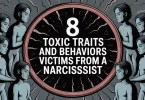Some truths about narcissists don’t hit you until it’s already too late. So, let’s talk about six brutal truths survivors learn, usually the hard way. These truths explain why it hurts so much and why it kept happening.
1. Their Love Is a Strategy, Not a Feeling
The first thing we don’t see until it’s too late is that their love is a strategy, not a feeling like love should be. The problem is, it felt like love, and in that moment, the narcissist believed it too, so it came across as super believable. But what they were feeling wasn’t love; it was idealization.
They called it love because they saw you as the answer to something they couldn’t name. They saw you as someone who would fix the emptiness they would never admit to. They weren’t pretending, not at first, but narcissists don’t know what real love is. Love requires empathy, the ability to care about someone else’s feelings, even when those feelings don’t benefit you, and that’s something narcissists don’t have reliable access to.
Instead of building a relationship slowly, they fast-tracked it. They latched on hard and mirrored everything you valued: your dreams, struggles, and worldview. It felt like this relationship was destined, fated. Maybe you noticed a few things that felt off, we usually do, but you talked yourself out of them.
We usually do that too. Maybe you brushed it off when they said, “I love you,” almost immediately, or they started talking about forever before they knew your last name. How about when they professed their undying love one day and then ghosted you the whole next week? You might have told yourself the love-bombing was just passion, it’s easy to do.
Related Topics:
8 Signs You’re in a Narcissistic Relationship
How Narcissists Try to Control You?
7 Ways to Torture A Narcissist
You might have told yourself they ghosted you because they were scared of how deeply they felt. But what you were seeing was emotional dependency, not love. It was someone trying to merge with you instead of connecting with you. If you’re just an extension of them, they can control how you make them feel.
The moment you showed up as a full human, with a boundary, a bad day, or just a different opinion, the illusion came crashing down. Not because you failed, but because you stepped outside the fantasy they needed you to stay in.
That’s the brutal truth: their version of love wasn’t about who you were; it was about how well you played the role they had in their head. Looking back, one thing you probably wish you knew but is helpful to know now is that they don’t understand love, and what felt like love was not love at all.
2. The Version of You They Loved Isn’t Real
The next thing that would have been helpful to know is that the version of you they created isn’t real. We talk a lot about how the version of the narcissist they present in the beginning isn’t real, and that’s true. But the version they see in you is also not real.
The narcissist didn’t fall for you; they fell for who they thought you were or, more accurately, who they wanted you to be. At first, it felt like they saw you, like on a soul level, as if they understood parts of you no one else had. But when you look back, it wasn’t about understanding; it was about confirmation. They locked onto the parts of you that made them feel good and ignored the rest.
You may not have realized it at the time, but that kind of attention comes with a cost. They weren’t interested in all of you; they were hyper-focused on the version of you that made their world easier, the one who made them feel admired or important.
When something about you didn’t match that version, you probably saw a shift in them. Maybe they pulled away or got cold. Maybe they said things like, “You’re acting different lately,” or, “Where did all this come from?” That’s when you started second-guessing yourself, not just your words, but your personality.
Maybe you started tiptoeing around things that used to come naturally, not to keep the peace, but to keep the connection that was so important to you at the time.
I want to drive this point home: they were not falling in love with the real you. They were feeding off the version of you they built in their head. The moment you didn’t fit that version, everything changed. You saw it; you just didn’t know why, and you probably blamed yourself.
3. They’re Addicted to Control, Not Chaos
Another thing that would have been helpful to know is that narcissists are addicted to control, not chaos. This one can be confusing because narcissists love to start drama, but the reason they create chaos is to gain control. At first, you probably didn’t think of it that way. You may have told yourself they just had a temper or struggled with consistency.
If you’re highly empathetic, this is a trap you might fall into because you know how to help. It seems like with just a little work, a little tweaking, you could have everything you want. That right there is the trap; that’s what keeps you in it. They know this. They can see how you want to change them and help them. Even though they don’t want help, they won’t tell you that because they know that’s the hook that keeps you in.
Maybe they cried about how broken they were or promised to change the moment you started pulling away. But if you zoom out, the pattern comes into focus. The timing of their outbursts isn’t random.
Those sudden silences or arguments that started over nothing usually happened right after a moment when you were feeling confident, happy, or emotionally grounded, or when you were tired of it and started pulling away. Those moments weren’t about what you said or did; they were about disrupting your clarity, the clarity that was keeping you grounded and maybe keeping you away from them. Their goal was to get you to doubt your instincts so they could reassert control.
You may have missed some of the red flags, especially early on, because the chaos wasn’t constant; it came in cycles. One day, they were cold or combative; the next, they were affectionate, almost like nothing happened. That shift will keep you stuck. It trained your nervous system to chase the good version of them and tiptoe around the bad one.
You probably found yourself being extra careful with your tone, overthinking how to bring something up so it wouldn’t set them off, and bracing for the next mood swing. Bottom line: that chaos wasn’t a flaw in the system; it was the system. As long as you were confused, they were in control.
4. You Were Trained to Betray Yourself
The next thing that would have been helpful to know is that in this relationship, you were trained to betray yourself. One of the hardest things to accept after a narcissistic relationship is how many times you overrode your instincts, not because you were naive, but because you were being conditioned. It didn’t happen all at once, or you would have left.
It started small. Maybe they got annoyed when you brought up something that bothered you. Maybe they laughed when you were hurt and told you to lighten up, take a joke, or get over it. Little by little, you started questioning what you felt. You made excuses for their behavior and told yourself you were being too sensitive, even when something felt wrong.
After enough of these moments, you stopped trusting your gut and stopped showing up for yourself because every time you did, it came at a cost: disconnection, tension, or punishment. Somewhere along the way, their comfort became more important than your peace or clarity. That’s what makes this so brutal: it’s not just that they manipulated you; they taught you how to do it to yourself.
5. They Escalate When You Detach
Another brutal truth is that narcissistic relationships escalate when you detach. A lot of people think that once you leave, it’s over, you can have your peace and move on. But that’s not true for a few reasons. First, it takes time to heal from that type of abuse and manipulation and to get back to yourself.
But there’s another reason: if you were deeply connected and under their influence, detachment wasn’t just a simple shift to them; it was a major threat. Narcissists don’t let go when they lose interest; they let go when they lose control, and it takes a long time for them to admit defeat.
If they’ve ever had control over your emotions, thoughts, or choices, they’re not going to give that up quietly. When you started to pull away, when you stopped defending yourself, stopped playing into their fights, taking the bait, or trying to win them back, they felt it, and they escalated.
It’s not always obvious. Sometimes they come back with love-bombing or apologies that feel different than before, more self-aware or desperate, which makes them more convincing because they’re desperate for your supply. It feels like they’re desperate for you. Other times, they might disappear for months and then reappear the moment you start to feel okay again.
If you want the playbook for what happens when a narcissist realizes they’re losing control, you might see love-bombing: “Just give me five minutes,” “I miss you so much,” “I need to explain myself.” Maybe they apologize for everything they’ve done, saying everything you wanted to hear is the best of them.
But when that doesn’t work, you’ll see the worst. Many of us thought we knew the worst of this person, but at this point, you realize you hadn’t seen the worst at all.
This leaves you questioning: Who is this person? How deep does this go? How far will they go? These are valid questions, but not necessarily a reason to panic
The danger is that when you see the best or worst of them, you might be tempted to think they’re so desperate for you. But they don’t escalate because they care; they escalate because their grip is slipping, and they don’t know who they are without someone to control.
6. They Don’t Heal, They Recruit Replacements
The final brutal truth is that narcissists don’t heal; they just recruit replacements. When the relationship ended, you probably hoped they’d take time to reflect, to heal from this rollercoaster of a relationship that seemed so absurd and head-spinning. Anyone would need that time, right?
Or maybe you’re clear they were the toxic ones and hoped they’d finally see what they did and think about changing. But that’s probably not what happened. They moved on fast, didn’t they? Not just casually, they found someone new, painted them as “the one,” and picked up right where they left off, as if none of it ever happened.
I talk to so many people in this position, and it’s difficult to deal with, whether you ended the relationship or they did. When someone moves on that hard and fast, it’s a hit to your self-esteem. If you’re in this place right now, I want you to know it’s not because they’re over you; that’s impossible.
It’s impossible to get over a relationship that lasted months or years in seconds. They’re not over it, even if things ended badly or neither of you wants the other anymore. It’s natural to take a break after a relationship for self-reflection and self-care, especially after an emotional rollercoaster like this one. Your nervous system needs to reset, if nothing else.







Leave a Comment